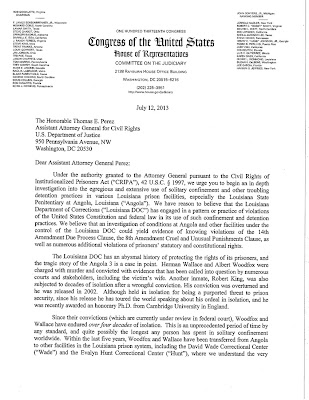A3 Newsletter: One Year Later: Albert Woodfox is still not convicted or released
One year ago today, supporters of Albert Woodfox were elated when Judge Brady’s ruling on Albert’s criminal case was announced. It was a THIRD overturning of his conviction!
How can it be possible that an innocent man, who now stands unconvicted in the eyes of the law, remains locked in a solitary cage while he waits for the State’s endless appeal efforts to play out? How many more appeals, how many courts will it take for the State to finally recognize that they’ve done enough to this man?
There are oceans of press – firsthand accounts, testimony, scientific reports, documentaries, videos, songs – all establishing the senseless torture that is solitary confinement in the U.S. today. We are heartened by the significant solitary reforms agreed to by NY state this week and the Colorado guard who just publicly committed to eliminating solitary in Colorado. Yesterday’s second set of hearings called by U.S. Senator Dick Durbin on solitary confinement were better attended with more spirited commentary than the first hearing last year (A written statement jointly submitted to yesterday’s hearing by Robert King and Albert Woodfox is reprinted below). We see a major shift occurring in the perception and use of solitary in this country. You can watch video footage of the hearings at CSPAN.
Across the country in California a prisoner who has spent more than 42 years in solitary, Hugo Pinell, was recently moved to another facility where he has greater access to visits and a promise of eventual transfer out of solitary. On the East Coast, the long time struggle to move Pennsylvania prisoner Russell Maroon Shoatz out of solitary succeeded just last week. State by state, correctional departments are reviewing this punishment modality that has raised such an outcry and are making changes. We can only pray that the State of Louisiana will join the rest of the country in recognizing that solitary confinement should be abolished, and begin by opening the gates for Albert.
Robert King Tours US & Canada to Speak Out for Albert Woodfox and Against Solitary Confinement
 |
| (PHOTO: Robert King and filmmaker Ron Harpelle w/ Kathleen Cleaver at the Montreal Black Film Festival on February 21, 2014. View more photos, including from Toronto’s Black Film Festival here.) |
As announced in our last newsletter, the Angola 3’s Robert King has been traveling in the US, speaking in Chicago about solitary confinement at the annual meeting of the American Association for the Advancement of Science, and in Canada alongside screenings of the film Hard Time. Featured below is a compilation of media coverage.
American Association for the Advancement of Science
BBC News: Scientists call solitary confinement ‘damaging and unnecessary’ II Japan Times / AFP: In prisons, solitary takes toll on minds II VIDEO: Science Magazine Live Chat w/ Robert King; Is Solitary Confinement Torture? II CNN: 29 Years in a Box
Hard Time Screenings in Montreal and Toronto, Canada
Tout Le Monde En Parle II Interview by Canadian Prison Radio Show II Morning News Montreal Televison Interview II La Presse: En croisade contre le milieu carcéral américain II Montreal Gazette Interview II Le Devoir: 29 ans d’isolement en prison
Angola Three: 42 Years of Solitary, 42 Years of Cruel and Unusual Punishment
–A statement submitted for the February 25 Congressional hearing on the use of solitary confinement in US prisons
Dear Chairman Durbin and Ranking Member Cruz:
My name is Robert Hillary King. I spent 29 years in solitary before I was freed in 2001 after proving my innocence. Since then I have worked tirelessly speaking and traveling around the world to raise awareness about prison conditions in the US, and to bring attention to the remaining member of the Angola 3-Albert Woodfox-who is still behind solitary bars in Louisiana after nearly 42 years actively fighting to prove his innocence in federal court.
Albert Woodfox’s murder conviction was overturned for a 3rd time in February of last year, and for a third time, the State of Louisiana appealed. As Woodfox, now 67, prepares to enter his 42nd year in solitary confinement, he continues to maintain his innocence.
The third member of the Angola 3, Herman Wallace, was released last October from 41 years of solitary confinement after his conviction was overturned, but died 3 days later of advanced liver cancer at the age of 72. A group of U.S. Congressmen saw fit to mark his passing by entering a tribute to Wallace into the Congressional record, describing him as a “champion for justice and human rights.”
Many people ask me to describe my nearly 3 decades in solitary. Here is an excerpt from my autobiography where I attempted to put these experiences into words:
“Solitary confinement is terrifying, especially if you are innocent of the charges that put you there. It evokes a lot of emotion. It was a nightmare. My soul still cries from all I witnessed and endured. It mourns continuously. Through the course of my confinement I saw men so desperate that they ripped prison doors apart and both starved and mutilated themselves. It takes every scrap of humanity to stay focused and sane in that environment. The pain and suffering are everywhere, constantly with you. There’s no describing the day to day assault on your body and your mind and the feelings of hopelessness and despair.”
Over a decade ago Herman, Albert and I filed a landmark civil lawsuit challenging the inhumane and increasingly pervasive practice of long-term solitary confinement. Magistrate Judge Dalby describes our almost four decades of solitary as “durations so far beyond the pale” she could not find “anything even remotely comparable in the annals of American jurisprudence.” The case, scheduled for trial in June 2014, will detail decades of unconstitutionally cruel and unusual treatment (in violation of 1st, 4th, 8th, 13th and 14th Amendment rights) and systematic due process violations at the hands of Louisiana officials.
In July 2013 a group of US Congressmen issued a statement from the House Judiciary Committee calling on DOJ to investigate “the egregious and extensive use of solitary confinement and other troubling detention practices in various Louisiana prison facilities,” alleging that the Louisiana Department of Corrections “has engaged in a pattern or practice of violations of the US Constitution and federal law in its use of such confinement and detention practices.”
Then in October, the United Nations Special Rapporteur on torture, Juan E. Méndez, called on the United States to immediately end the indefinite solitary confinement imposed on Albert Woodfox since 1972 saying “keeping Albert Woodfox in solitary confinement for more than four decades clearly amounts to torture and it should be lifted immediately.”
Although Albert has not had any disciplinary infractions in decades, and prison mental health records confirm that he is neither a danger to himself or others, he continues to be held in a 6×9 foot cell for 23, sometimes 24 hours a day. He is only allowed to leave the cell if chained at the ankles, wrists and waist, under escort, for up to one hour a day if weather allows in a small outdoor cage by himself.
For decades he’s been denied meaningful review of his isolation status:
“The only reason given for maintaining the men under these conditions has been due to the “nature of the original reason for lockdown.”
Amnesty International is firm in its belief that conditions for the men in CCR – 23 hour cellular confinement in stark, tiny cells; limited access to books, newspapers and TV; no opportunities for mental stimulation, work and education; occasional [non-contact] visits from friends and family and limited telephone calls – amounts to cruel, inhuman and degrading treatment.”
Amnesty goes on to detail the human rights violations involved in such extreme confinement:
“The USA has ratified the International Covenant on Civil and Political Rights, and the UN Convention against Torture and other Cruel, Inhuman or Degrading Treatment or Punishment, both of which prohibit torture or other ill-treatment. The relevant treaty monitoring bodies (the Human Rights Committee and the Committee Against Torture) have found that prolonged solitary confinement an amount to torture or other cruel, inhuman or degrading treatment. Both bodies have expressed concern that the harsh conditions of long-term isolation in some US segregation facilities are incompatible with the USA’s treaty obligations.
Amnesty International believes their findings are particularly significant in the case of Albert Woodfox and Herman Wallace given that few, if any, other prisoners have spent so long in solitary confinement in recent times.
Their treatment also contravenes the UN Standard Minimum Rules for the Treatment of Prisoners. These and other relevant standards emphasize the importance of providing work and educational, recreational, religious and cultural activities for prisoners’ mental and physical wellbeing, as well as to prepare individuals for reintegration into society.”
We respectfully submit this statement with the hopes that you can use your legislative powers to put an end to long term solitary confinement. Without uniform standards of the infractions serious enough to merit placement; a meaningful review process with outside oversight; and a grievance process, opportunities for socialization and education, and a clear written timeline and detailed action plan for the inmate’s release; this form of punishment serves no punitive or reformative purpose. In our view it is the very definition of cruel and unusual punishment as defined by the Constitution.
We believe that only by openly examining the failures and inequities of the criminal justice system in America can we restore integrity to that system. We are grateful for your efforts to do just that today.
Sincerely,
The 2 Surviving Members of “The Angola 3”
Robert King and Albert Woodfox
Keep in Touch with Albert:
Albert Woodfox #72148
David Wade Correctional Center
N1 A3
670 Bell Hill Road
Homer, LA 71040
























